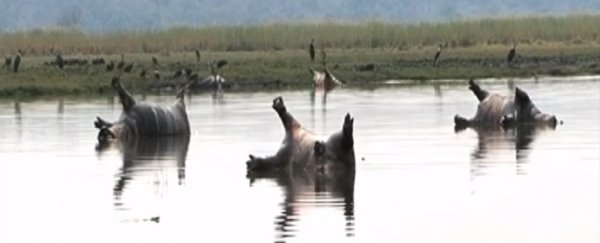More than 100 hippos have been killed in a suspected outbreak of anthrax in a remote national park in Namibia.
The first victim of the outbreak in Bwabwata National Park was noticed by park officials on October 1, but in less than a fortnight the infection rapidly spread, claiming a suspected 109 hippos in less than a fortnight.
"Over 100 hippos died in the past week. The cause of death is unknown but the signs so far show that it could be anthrax," Namibian environment minister Pohamba Shifeta told AFP.
"Our veterinary services are currently working at the area to determine the cause of death. Once we have the results of the cause of death than we can decide on the way forward."
 Namibian Broadcasting Corporation/YouTube
Namibian Broadcasting Corporation/YouTube
If anthrax does turn out to be responsible, the dead hippos, found lying on their sides and belly up in river waters, may not be the only casualties of the outbreak.
A number of dead water buffaloes are also reported to have been found, and there are concerns crocodiles preying on the dead hippos could also become infected, which is caused by the bacterium Bacillus anthracis.
Locals and Namibian authorities suspect anthrax on the basis of a history of outbreaks in the African region, with an estimated 300 dying in an episode in Uganda in 2004 after drinking contaminated water, with less severe incident following in 2010.
"This is a situation that we have seen before," Namibia's Director of Parks and Wildlife Management, Colgar Sikopo, told the New Era newspaper.
"It happened in Zambia before, and it mainly occurs when the level of the river is [low]."
 Namibian Broadcasting Corporation/YouTube
Namibian Broadcasting Corporation/YouTube
Aside from the regular anthrax infection, scientists have also recently investigated a mysterious hybrid strain of the pathogen linked to the deaths of chimpanzees, gorillas, and elephants.
This strain is thought to be responsible for almost 40 percent of animal deaths Taï National Park in the Ivory Coast during the study period.
There's no evidence that this particular strain is what's behind the hippo deaths, however, and officials are hoping Bwabwata National Park's remoteness could prevent the outbreak from spreading to other wildlife in the region.
In addition to wildlife, about 5,500 people are estimated to live in Bwabwata National Park, and authorities are warning them to be wary of the affected area, and especially not to consume the hippo flesh.
"We strongly advise that they must not consume this meat," Sikopo told New Era.
"What we are doing is we are trying our best to burn every carcass to prevent further spreading of the disease, but also to ensure that no person gets to these animals and starts feeding on the meat."
As for the local hippo population, it's unclear how much of an impact this will ultimately have.
The species is listed as "Vulnerable" by the International Union for the Conservation of Nature, and about 1,300 were estimated to live in Namibia before the outbreak.
As for what the count will be after this, we'll have to just wait and see.
"There's not much we can do," acting director of the Ministry of Environment and Tourism, Johnson Ndokosho, told National Geographic.
"We can't move the wildlife."
